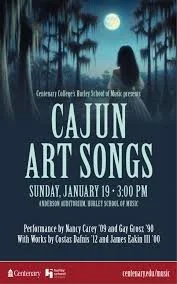Lâche pas: Cajun Artsongs
“LÂCHE PAS” CAJUN ART SONGS
Lâche pas is the work of soprano/ethnomusicologist Nancy Carey and composer Costas Dafnis. The set of songs for voice and piano was featured in JE NE VAIS PAS PARLER FRANÇAIS À L’ÉCOLE: Preservation of Cajun Culture Through Song (University of Memphis, 2019) and previous performances include recitals and conferences in New Orleans, Memphis, Shreveport and Monroe.
Lâche pas will be recorded in Spring 2026 in San Francisco, with generous support from ________________.
Listen to Rehearsal Drafts from Lâche pas
NANCY CAREY, SOPRANO & ETHNOMUSICOLOGIST
Soprano Nancy Carey has recently been a featured concert soloist with South Arkansas Symphony Orchestra, Shreveport Symphony Orchestra, Rapides Symphony Orchestra, and Monroe Symphony Orchestra. Recent opera roles include Gretel in Hansel and Gretel with South Arkansas Symphony Orchestra, Golde in Fiddler on the Roof with Louisiana Opera, Galatea in the Opera Memphis Midtown Opera Festival production of Die schöne Galathée, and “elle” in Francis Poulenc’s operatic monodrama La voix humaine at Marigny Opera House in New Orleans. She is also an annual performer for New Music on the Bayou, an international festival for contemporary chamber music.
In addition to her work as a performer, Nancy conducts research in the field of ethnomusicology. Her research focuses on the relationship between folk music traditions and the sustainability of Louisiana’s francophone culture. She presented her research at the Society for Ethnomusicology’s Annual Meeting in 2018, as well as the inaugural Franco Music Forum in 2021, which took place under the sponsorship of Sorbonne University, the University of Louisiana-Lafayette, and the University of the Antilles. This aspect of her career began when she partnered with composer Costas Dafnis on the first collection of Cajun folk songs arranged for voice and piano. She has since served as song historian and diction consultant on La Délaisée, a collection of Cajun songs arranged by composer James Eakin.
Nancy holds a Doctorate of Musical Arts from University of Memphis, a Master of Music degree from Louisiana State University, and a Bachelor of Music degree from Centenary College of Louisiana. She is currently Assistant Professor of Music and Leon Hammons Endowed Professor of Music at University of Louisiana at Monroe where she teaches voice and music theory courses.
JE NE VAIS PAS PARLER FRANÇAIS À L’ÉCOLE: Preservation of Cajun Culture Through Song
The purpose of this dissertation is to identify gaps in existing literature and records of Cajun folksongs, and to validate art song arrangements of this repertoire as a significant contribution to the canon of Cajun music. Though it continues to evolve and thrive as a commercial music genre, Cajun folk music is underrepresented in notated form. Transcription is vital to the preservation of folk music; however, previously published collections of these folksongs offer incomplete analysis.
Composer Costas Dafnis’ arrangements of these songs for voice and piano have the potential to increase their exposure with classical musicians in professional and academic settings, and also to ameliorate existing collections of these songs. Art songs serve as ideal vessels for disseminating folk music. Through the arranging process, a strict lens of analysis isolates rhythmic structure, individual components of melody, and harmonic function in a manner which may illuminate previously unexamined style traits. This process of analysis is its own contribution to the literature of folk traditions, and offers a further contribution by introducing this rich song tradition to a new audience of performers and scholars who are custodians of historical music.
The title of this dissertation makes reference to the eradication of the French language from Louisiana schools during the 20th century. Students who used French in spoken or written form were sternly punished and famously asked to write one hundred lines of: I will not speak French in school. Songs became the primary vehicle for oral tradition during and following this French language moratorium.


